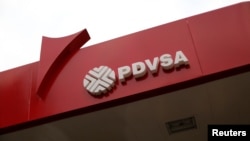Venezuelan state oil company PDVSA faced a $1.2 billion bond payment on Thursday, a test of the ruling Socialist Party's resolve to pay its foreign debt despite a crippling economic crisis that has spurred widespread food shortages.
Markets remained optimistic that President Nicolas Maduro's government would make the payment, though investors expected delays. PDVSA last week struggled for days to deliver funds for a separate bond payment amid confusion over which banks were charged with transferring the money.
However, most economists say a default is increasingly likely in the medium term as Venezuela's collapsing socialist economic model has left the once-prosperous population destitute and led to deterioration of the OPEC nation's vital oil industry.
"Their ability to pay seems to be very precarious, and that's reflected in the lateness of the payments of the coupon as well as the amortization payments," said Josephine Shea, director of emerging markets at Standish, a BNY Mellon subsidiary that has $154 billion under management.
"My expectation is that eventually these bonds will have to be restructured ... most likely through a default situation."
Maduro insists his government will pay all its debts but says it is a victim of an "economic war" led by opposition adversaries and fueled by U.S. sanctions that block Venezuela from refinancing its debt.
PDVSA's 2017N bond has rallied in recent weeks on market optimism that it will be paid down, driven by the completion, albeit delayed, of an $842 million principal payment on PDVSA's 2020 bond.
PDVSA and Venezuela bonds were rising slightly in early trading on Thursday, according to Thomson Reuters data, with the PDVSA 2022 bond rising 0.750 percentage point to a bid price of 48.000.
PDVSA did not immediately respond to an email seeking comment.
After Thursday's payment, Venezuela has no foreign bond maturities until the second half of 2018.
But in a possible sign of financial desperation, Venezuela and PDVSA have been skipping interest payments since the start of October, racking up close to $750 million in pending coupons by repeatedly invoking 30-day grace periods.
Even if it scrapes together the funds to pay those down, it faces at least another $800 million in interest payments in November and December.
Food, medicine shortages
The country is struggling with shortages of basic products such as food and medicine, in part because hard currency for imports is being diverted toward Wall Street investors.
Child malnutrition has reached the scale of a humanitarian crisis in four Venezuelan states, according to a May 2017 report by Caritas Internationalis, a Rome-based nongovernmental organization with links to the Roman Catholic Church. Medicine shortages have also left children dying of preventable diseases.
Government officials say ideological adversaries are exaggerating problems for political effect.
But the situation is a stark contrast to the oil boom years of the late socialist leader Hugo Chavez, who spent generously on social welfare programs while borrowing profusely to keep spending at full tilt.
Venezuela's debt is the highest yielding of emerging market bonds measured by JPMorgan's EMBI Global Diversified Index, paying investors an average of 31 percentage points more than comparable U.S. Treasury notes.
That is nearly double the spread on bonds issued by Mozambique, which is already in default, and more than six times the spread on bonds from war-torn Ukraine.





